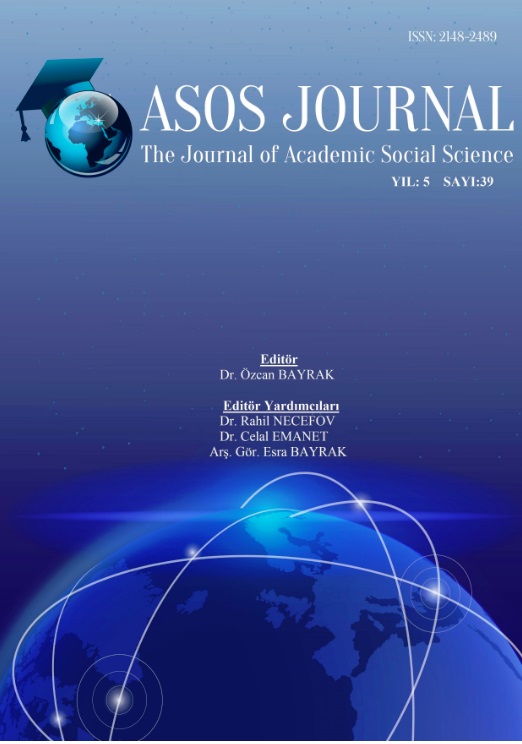TÜRKİYE’DE 2005-2015 YILLARI ARASINDA İLK OKUMA YAZMA ALANINDA YAPILAN LİSANSÜSTÜ ÇALIŞMALARIN DEĞERLENDİRİLMESİ
Author :
Abstract
Toplumlar örf, adet, gelenek, görenek v.b. tüm yaşanmışlıkları olan kültürlerini nesilden nesile eğitim yoluyla aktarır. Toplumu oluşturan insanlar eğitim eliyle yetiştirilir. Eğitim politikaları devlet tarafından belirlenir. Toplumların dolayısıyla insanın sahip olması istenen nitelikler dönemden döneme farklılıklar gösterir. Değişen çağın ihtiyaçları da farklılaşır. Yetiştirilmek istenen insanın özelliklerini karşılayacak olan eğitim de değişime ayak uydurmalıdır. Bu nedenle belli dönemlerde eğitim programlarında değişimler gerçekleştirilir. Ülkemizde son olarak geliştirilen eğitim programı köklü değişiklikler içermektedir. Felsefesi ile en baştan yenilenen program 2004 yılında taslak halinde olup belli pilot uygulamalarla test edilmiş, 2005’te tüm yurtta uygulanmıştır. Türkçe programı içindeki en önemli değişim kuskusuz ilk okuma yazma öğretiminde Cümle Yöntemi yerine Ses Temelli Cümle Yönteminin kullanılmasıdır. Ayrıca tüm eğitim kademelerinde sadece bitişik eğik yazı kullanılmakta ve ilk okuma yazma öğretimine bitişik eğik yazıyla başlanmaktadır. Bu çalışmada Türkiye’de 2005-2015 yılları arasında ilk okuma yazma alanında hazırlanan doktora ve yüksek lisans tezlerinin incelenmesi amaçlanmıştır. Çalışmanın örneklemini YÖK tez arşivinden elde edilen ve erişime açık olan lisansüstü eğitim tezleri oluşturmaktadır. İlgili tezler doküman incelemesi metoduyla çok boyutlu olarak incelenmiştir. Veri toplama aracı olarak literatürdeki analiz formları incelenerek araştırmacılar tarafından tez inceleme formu geliştirilmiştir. Bu formda tezler yıllara, tezlerin türüne, tezi hazırlayan kişilerin cinsiyetlerine, teze danışmanlık yapan öğretim üyelerinin cinsiyetlerine ve unvanlarına, tezin yapıldığı enstitüye ve anabilim dallarına, tezde kullanılan veri toplama araçlarına, araştırma modeline ve yöntemine, uygulama yapılan örneklem grubuna ve sayısına, yapıldığı illere, kullanılan anahtar sözcüklere, kaynak sayılarına göre incelenmiştir. İnceleme sonucunda elde edilen bulgular yüzde ve frekans tablolarıyla gösterilerek yorumlanmış, önerilerde bulunulmuştur.
Keywords
Abstract
Societies transfer their cultures that incorporate all their life experiences such as customs, traditions, etc. from one generation to another through education. People who form the society are raised through education. Education policies are determined by the governments. The traits of society, therefore, the traits of persons vary from period to period. The needs of changing epoch also differ. The education must keep pace with the change in order to meet the needs of traits of the person desired to be raised. Therefore changes are carried out in educational programs in some specific periods. The education program developed recently in our country embraces fundamental changes. The program has been redesigned from the beginning including its philosophy and tested as a pilot program in draft form in 2004 and has been applied throughout the country. The most significant change in the Turkish program, undoubtedly, is the utilization of the Sound Based Sentence Method in the teaching reading and writing in the first grade of elementary school instead of Sentence Method. Moreover, only running italic writing style is used in all education levels and the teaching of reading and writing in first grade starts with running italic writing style. The purpose of this study is to evaluate the doctoral and master’s theses prepared on the field of teaching reading and writing in first grade in Turkey between 2005 and 2015. The samples for this study consist of postgraduate theses obtained from the theses archives of YÖK (Higher Education Council) that are open to public access. Related thesis were examined using document review method with a multidimensional approach. Analysis forms in the literature were examined as the data gathering tools and a thesis review form was developed by the researchers. The thesis in this form were examined according to the years, the types of thesis, the genders of people- who prepared the thesis, the genders and titles of lecturers who served as thesis supervisors, the institutes and departments where the thesis was prepared, the data gathering tools utilized in the thesis, the research model and method, the sample group the research tool was applied to and its quantity, the cities where the research was conducted, the keywords used, the number of resources. At the end of the review, the findings were interpreted with percentage and frequency tables and recommendations were made.
